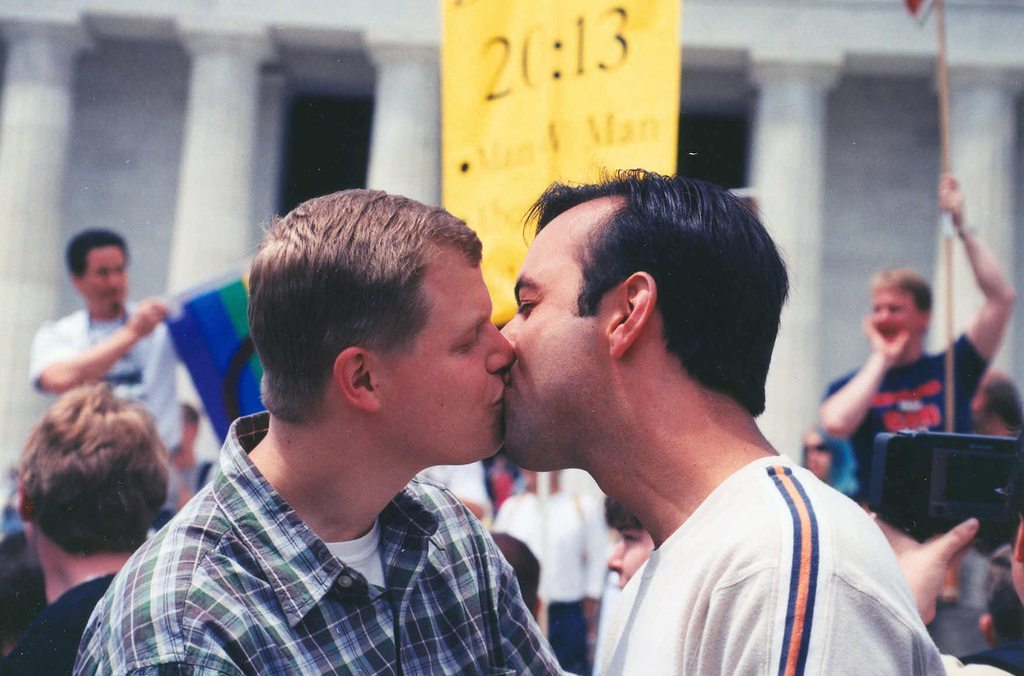His father told NBC News that his son was affected by a recent incident involving two men showing each other affection.
“We were in downtown Miami, Bayside, people were playing music. And he saw two men kissing each other in front of his wife and kid, and he got very angry,” Mateen’s father, Seddique Mir Mateen, said Sunday. “They were kissing each other and touching each other, and he said: ‘Look at that. In front of my son, they are doing that.’ And then we were in the men’s bathroom, and men were kissing each other.”
I must have been about twelve years old when I first saw a gay couple kissing. It was on the cover of the Boston Herald sometime in 1989, highlighting a story about a gay rights protest; the photo also showed a presumably straight man walking by in disgust. I remember thinking to myself at the time that seeing two men kissing was weird, but that they really must like each other.
Growing up, I can’t recall my family discussing homosexuality. However, I can recall preachers viciously inveighing against homosexuality in some of their sermons, and thinking to myself how horrible it must be for some gay or lesbian kid in the congregation to have to listen to that stuff; I distinctly remember some of the teenagers in the congregation becoming visibly agitated as the preachers railed against homosexuality. Some of those preachers went on to become figures in the anti-marriage-equality movement in Massachusetts during the mid-2000s, even condemning then-gubernatorial candidate Deval Patrick when he embraced marriage equality in his successful bid to become the Bay State’s first African-American governor.
In his 2011 memoir A Reason to Believe: Lessons from an Improbable Life, Patrick recounted his fight with the anti-gay preachers:
During my campaign for governor in 2006, the question of marriage equality was hotly debated. The Massachusetts Supreme Judicial Court had struck down practices that limited marriage to the union of a man and a woman, and many tried to organize a ballot initiative to overturn the Court’s ruling. I agreed with the ruling and supported marriage equality. Churches were deeply divided. The black church was particularly agitated, in part because the radical right promised that unless the court’s decision was overturned, churches would be forced to marry gay and lesbian couples or risk losing their tax-exempt status. My sister and her husband, Bernie, were active in one of the largest black churches in Boston, [whose preacher] denounced me and my candidacy from the pulpit on many Sundays while Rhonda and Bernie sat in the front pew.
I met with [the anti-gay preachers] in Boston during the campaign, asking for their support while acknowledging our differences on this issue. I said I believed in a politics that did not require that we agree on everything before we could work together on anything. And I challenged them to work with me on the issues I believed their parishioners cared most about, such as being able to pay their rent and their heating bill in the same month. I’m happy that I got their support in the end, but a lot of nasty things were said. For some of these black ministers, the notion of social justice, faith in action, was secondary.
It has been one year since the United States Supreme Court declared marriage equality the law of the land. It has been two weeks since a madman apparently filled with self-loathing borne of a homophobic culture ended 49 innocent lives. It’s obvious that nearly five decades after Stonewall, in many respects we haven’t even started the process of tearing down the walls of homophobia in this country.

I remember those preachers condemning what they called the normalization of homosexuality. We need to make the worst nightmare of those preachers come true. We have a moral obligation to normalize homosexuality, to make future generations understand that there is nothing more normal, more natural, more human than two men kissing or two women kissing. It’s love, simple and plain.
Our culture has to play a greater part. Hey, Hollywood, where are the LGBTQ romantic comedies? (Note that I said Hollywood, not independent filmmakers.) As big of a name as Ellen DeGeneres is, she should be doing more onscreen than cartoons, no? The same point Nick Kristof made eleven years ago about Hollywood’s failure to reflect real romantic life onscreen when it comes to race also applies to sexuality.
Support for the LGBTQ community must become a litmus test for those who seek our vote. Failure to support full equality for the LGBTQ community must be regarded as a sign of one’s lack of fitness to serve. If voters do not demand a full commitment to LGBTQ equality from political aspirants, then those who were slain in Orlando will have died in vain.
Orlando will be remembered as the Birmingham of the LGBTQ rights movement. I can’t help thinking that the four young girls who died that day in 1963 and the forty-nine young men and women who died that day in 2016 are standing right next to each other in Heaven, all of them looking down at us still on Earth, all of them wondering if we will finally do what it takes to end hate in our time.
UPDATE: President Obama on how far the LBGTQ community has come since Stonewall–and how far America must go before we can honestly say that all of our citizens are treated as equals.



